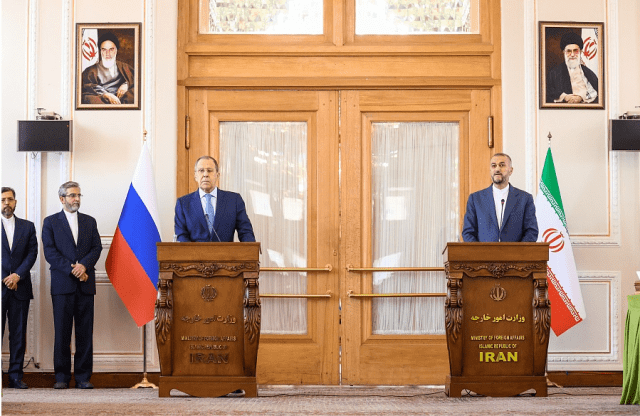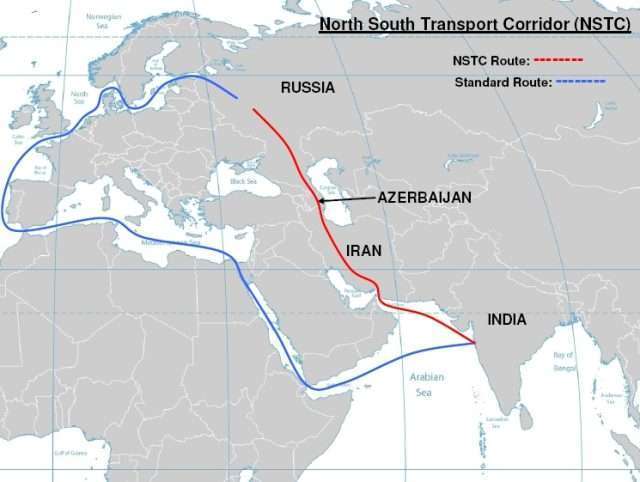Russia and Iran: boosting strategic partnership to counter Western pressure

Geopolitical Report ISSN 2785-2598 Volume 20 Issue 18
Author: Luca Urciuolo
Although Russian – Iranian ties date back to the Islamic Revolution, Moscow’s ongoing conflict in Ukraine (or special military operation as the Kremlin has always declared) and Tehran’s nuclear ambitions have strengthened the cooperation and pushed these Western adversaries together.
n June 22nd-23rd, 2022, Russian Foreign Minister Sergei Lavrov arrived in Iran for a two-day visit after his Iranian colleague, Hossein Amir-Abdollahian, invited him. This was Lavrov’s first official trip to Tehran since Ebrahim Raisi assumed the presidency in August 2021. The visit comes amid growing tensions between the West and Russia and uncertainties over the talks in Vienna on the Joint Comprehensive Plan of Action (JCPOA). Moreover, other crucial issues were on the table, such as the International North-South Transport Corridor (INSTC), the Syrian and Afghanistan scenarios, and trade relations, considering that both countries suffer Western sanctions and want to overturn the US-led global world order in favour of a multi-polar one.
A growing cooperation
One of the consequences of the sanctions imposed by Western countries on Russia is stimulating the latter’s search for ways to bypass the restrictions. Since the actions taken by Western governments to punish Russia for its annexation of Crimea in 2014, Russia has been eagerly working to overcome the obstacles caused by Western decisions regarding its foreign trade. It is also natural for Iran, which suffers from Western sanctions, especially the harsh US sanctions imposed by the Trump Administration in 2018 when he withdrew from the 2015 nuclear agreement.
Developing ties is fruitful for both countries: on the one hand, Russia is Iran’s most essential and most prominent neighbour; on the other hand, Iran is of great importance to Russia due to its natural resources and excellent geographical position that plays the role of a bridge between Asia and Europe. Ongoing talks and meetings between Iranian and Russian officials indicate the two sides’ serious determination to form a new era of strategic cooperation. Lavrov’s visit to Tehran reinforced the Russian Iranian relationship at all levels. Discussions shifted from international and regional developments to bilateral ties.
Concerning JCPOA, Lavrov said, “our goal is to rectify what the United States did wrong. When the United States quit the deal and withdrew [support for UN Security Council] Resolution 2231, it once again violated international law. We must work to revive the JCPOA in its 2015 original form without any additions.” He also added that “all illegal sanctions imposed against Iran, which contravene the JCPOA, must be removed. We hope the United States would make a logical decision, though we are not very confident in this regard.” Asked about Iran-Russia’s cooperation in reaching a good and lasting agreement and the US’s lack of commitment to imposing new sanctions on Iran, Lavrov said that “the United States considers its internal considerations not only in the JCPOA-related negotiations but also in any other issue. The United States acts based on its problems.” [1]
With Russia and Iran facing severe international sanctions, the two foreign ministers said their governments were jointly working out solutions to overcome the impacts. During the Tehran presser, Amir-Abdollahian and Lavrov also pointed out non-JCPOA issues, including work toward a 20-year strategic partnership deal, on which Russia and Iran have agreed in principle. Despite widespread public criticism, Iran inked a similar agreement with China last year as part of a “look to east” approach in its foreign policy to neutralise US sanctions.
The meeting between the two diplomats covered the ongoing Russian conflict in Ukraine. “While we oppose wars, we do also oppose the imposition of sanctions against other countries, including Russia,” Amir-Abdollahian declared, repeating the Iranian official line. Since the outbreak of the war, the Islamic Republic has refused to publicly condemn Russia for invading its western neighbour, repeatedly attempting to shift the blame from its allies in the Kremlin. “There is no doubt that provocation by the United States and NATO is the root cause of the [Ukraine] conflict,” Raisi told Lavrov following the latter’s arrival in Tehran. “Therefore, pushes for NATO expansion anywhere in the world must be actively blocked.” [2]
Tehran has said it is ready to help mediate, but it is unclear if Moscow wants mediation. Iran has backed attempts for a ceasefire, and its president has expressed hope for ending the Ukraine conflict. “As the Islamic Republic of Iran, we are trying, between Ukraine and Russia, to advance the Ukrainian crisis as soon as possible through negotiations and a political solution by understanding the founders and roots of this crisis,” its foreign minister has said.[3]
Particular attention during the talks was paid to trade and economic issues, investment, and the need to expand bilateral relations as a countermeasure to the Western sanctions that hang on both countries. Trade between Russia and Iran showed a record growth of 81% in 2021, exceeding 4 billion dollars for the first time.[4] However, Iranian President Ebrahim Raisi said that level was “not acceptable” and vowed to increase two-way commerce to 10 billion dollars a year.[5]
Moreover, top officials set an even more ambitious target. Tehran and Moscow plan to raise trade to $40 billion within the next year and a half, said Iranian Oil Minister Javad Owji, who co-chairs the commission from the Iranian side.[6] For this purpose, Russia and Iran signed a mutual trade agreement establishing trade centres in St. Petersburg and Tehran. A Russian delegation led by Russian Deputy Prime Minister Alexander Novak visited Tehran at the end of May to promote economic cooperation. The delegation included representatives from the relevant ministries and agencies, the heads of Russian regions cooperating with Iran, and business representatives. They met with their Iranian counterparts to discuss purely practical issues of expanding cooperation, outlining action plans for such areas as energy, transport, agriculture, finance, banking, and customs.
“We highlighted success in implementing our flagship projects, including the Bushehr Nuclear Power Plant (the second and third units being under construction), the Sirik Thermal Power Plant that is being built with the state loans issued by the Russian Federation, and a project to upgrade a railway section,” said Lavrov at the joint news conference with Amir-Abdollahian, on June 23rd, 2022.[7]
To further develop and deepen bilateral relations, Iranian authorities seek to revive the recently stalled INSTC project as an alternative to the Suez Canal. This crossing is a project approved by Russia, India, and Iran precisely 20 years ago (the agreement was signed in May 2002). The project aims to establish a transport route from the vast circle of the Indian Ocean, including the Gulf, and not only its Iranian part (the Sultanate of Oman was involved in the project), but a road also that starts from the Indian port of Mumbai by sea to the port of Bandar Abbas in southern Iran and continues overland by rail to cross Iran, Azerbaijan, and Russia from its Caucasian borders to its northern European borders. The project has a second branch that travels from Iran to Russia via the Caspian Sea and a third that passes through Kazakhstan, Uzbekistan, and Turkmenistan in Central Asia.

On June 11th, 2022, as the Islamic Republic News Agency (IRNA) reported, to implement the INSTC, the Islamic Republic of Iran Shipping Lines (IRISL) has initiated the transit of cargo from Russia to India or South Asia through the route, using just one consignment note for the entire transit route. Such transits have occasionally occurred in recent times. However, this route has clear advantages: lower transport costs (such as port and customs charges in particular), shorter waiting periods for containers, faster delivery of goods, elimination of dangers in transferring empty or full containers, issuance of legal documents and compensation for possible losses, and quicker banking transactions.
The first pilot Russian-Iranian transit proposed by IRISL consists of two 41-ton containers of laminated wood plastic. The consignor is in St. Petersburg, and the transit port is in Astrakhan. The cargo will then be transported by the Caspian Sea to the northern Iranian port of Anzali (Bandar-e Anzali) and then by road through Iranian territory to the southern port of Bandar Abbas on the Persian Gulf and further by sea to the Indian port of the Nhava Sheva.[8] The estimated delivery time is 25 days. It is assumed that the main Russian exports through Astrakhan could be cereals (wheat), timber, and scrap metal.
The plan for further joint use of the INSTC includes constructing a railway line that could bring goods arriving at Iranian Caspian Sea ports to the south-eastern port of Chabahar. This transport corridor could go to Afghanistan via Iran’s Sistan and Baluchestan Province. In addition, the construction of a railway line from Chabahar to the Hajigak in Afghanistan, where India has made considerable investments, is also under consideration. The INSTC emphasises the Russian port of Astrakhan and the Iranian Chabahar as bases for further transport to Eurasia. The development of the latter and the construction of a giant petrochemical complex and an export terminal near the port of Jask are projects being implemented by the Iranian government as part of the Mokran coastal development strategy. Nevsky Shipyard produces multipurpose dry-cargo ships of RSD49 (deadweight of 7150 tons, container capacity of 289 TEU) and 005RSD03 (container capacity of 225 TEU) projects. It is also engaged in the work of the North-South transit corridor in building ships for the Caspian Sea.[9]
Conclusion
Russian Iranian relations are one of the foundations for multipolarity in the Eastern Hemisphere. Russian Foreign Minister Lavrov’s trip to Iran has attracted enormous international attention given the Islamic Republic’s rising role in his Great Power’s grand strategy. It also follows Iran becoming increasingly active on the diplomatic scene after dispatching its foreign minister to India and hosting several Central Asian leaders. The reason behind all this is that Iran is becoming the core of Eurasian connectivity projects, which in Russia’s case, turns it into the gateway to India.
The fate of the INSTC was uncertain for the past few years but has recently received a second wind due to the conflict in Ukraine: the US-led Western sanctions practically cut Moscow off from most international logistics corridors. The INSTC nowadays is the only one it still has access to. With India functioning as Russia’s irreplaceable valve from Western pressure that preemptively averted its potentially excessive dependence on China and thus secured Russia’s strategic autonomy, it is more urgent than ever for Moscow and Teheran to cooperate more closely.
Sources
[1] PressTV Staff (2022) Iran serious about lasting agreement, Russia supports Tehran’s positions: Iranian FM. PressTV. Link.https://www.presstv.ir/Detail/2022/06/23/684408/Iran-Foreign-Minister-Hossein-AmirAbdollahian-serious-lasting-agreement-JCPOA-Vienna-talks–
[2] Al-Monitor Staff (2022) Iran hopeful nuclear talks will resume as Russian FM visit. Al-Monitor. Link. https://www.al-monitor.com/originals/2022/06/iran-hopeful-nuclear-talks-will-resume-russian-fm-visits.
[3] Seth J. Frantzman (2022) Russia’s Lavrov set to make important Iran trip. The Jerusalem post. Link. https://www.jpost.com/international/article-710096.
[4] Farid Malikov (2022) Russia, Iran to Expand Use of National Currencies in Trade. Caspian News. Link. https://caspiannews.com/news-detail/russia-iran-to-expand-use-of-national-currencies-in-trade-2022-5-26-54/.
[5] Bloomberg News (2022) Russia, Iran Tighten Trade Ties Amid US Sanctions. Bloomberg. Link. https://www.bloomberg.com/news/articles/2022-05-25/russia-iran-tighten-trade-ties-amid-us-sanctions-interfax-says.
[6] Iran-Russia annual trade to hit $40 billion in 18 months: Minister. Islamic Republic News Agency. Link. https://en.irna.ir/news/84780551/Iran-Russia-annual-trade-to-hit-40-billion-in-18-months-Minister.
[7] Foreign Minister Sergey Lavrov’s statement and answers to media questions at a joint news conference following talks Minister of Foreign Affairs of Iran Hossein Amir-Abdollahian, Tehran, June 23rd, 2022. The Ministry of Foreign Affairs of the Russian Federation. Link. https://mid.ru/en/foreign_policy/news/1819259/.
[8] Iran kicks off pilot transit via North-South Corridor. Islamic Republic News Agency. Link. https://en.irna.ir/news/84784416/Iran-kicks-off-pilot-transit-via-North-South-Corridor.
[9] Vladimir Platov (2022) Iran and Russia Revive the North-South Transport Corridor. New Eastern Outlook. Link. https://journal-neo.org/2022/06/20/iran-and-russia-revive-the-north-south-transport-corridor/.
Disclaimer. The views and opinions expressed in this report are those of the author and do not necessarily reflect the official policy or position of SpecialEurasia.
